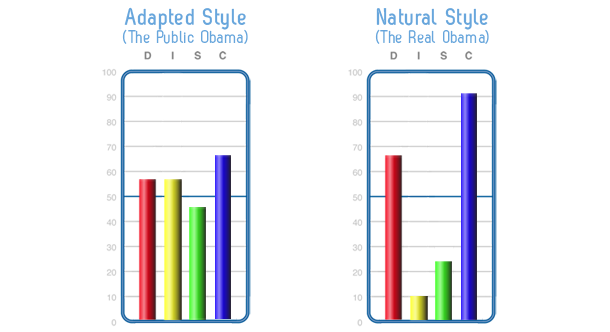DISC Profile of Barack Obama & A Surprise Introvert
Barack Obama has what Will Smith, Jennifer Anniston, Johnny Depp and Lady Gaga all have in common, along with what casting agents for big movies and judges on the X-Factor panel are looking for that go beyond the contestants' voice, looks or dance moves. That particular factor is that he is intriguing. There’s something about Obama that keeps you watching, pulls you in closer and makes you want to get to know him. He’s bizarrely — even freakishly — likeable as far as politicians go. At least, the rest of the world seemed to like him overwhelmingly more than they did Romney. (See this BBC graphic.)
But popularity contests and politics aside, we’d like to focus on Obama’s personality, in particular his behavioural (DISC) style and high introversion.
Obama is an Introvert
Yes, Obama really is. Although not generally known to the public, it is something that has been widely commented on by people close to the U.S. president, as well as a range of reporters from The New York Times, CNN, Forbes, CBS News, The Washington Post, The BBC, and his most recent biographer, Jodi Kantor:
“He is an extremely solitary man. He is the most introverted president we have seen in the United States for decades.”
Before you protest, “That’s crazy, he’s so charismatic, and he’s got great people skills, and he’s such a good speaker, and — AND — he’s really good with people!” First, introversion has nothing to do with social competence. How well a person is able to communicate, build rapport, charm and influence others is one part of a much larger set of skills belonging to emotional intelligence (EI) — in which we suspect Obama scores very highly. When introverts have very polished social skills, it’s easy to confuse them for extraverts. (As with this very funny example.)
The terms "introversion" and "extraversion" originated with Carl Jung, and were later popularised by the MBTI assessment. Extraverts are energised by events, people and things in the outside world; introverts are more energised by their internal world, alone time and solitary activities. (Introversion is not the same as being shy. Shy people tend to avoid social encounters out of anxiety or fear.)
Culturally, we tend to associate leadership with extroversion and we can’t seem to completely break away from the idea that there’s something wrong with an introverted leader. There isn’t. And there have been a number of books, articles and prominent authors in recent times to challenge this belief, including Susan Cain, the author of “Quiet: The Power of Introverts in a World That Can't Stop Talking,” which ranked as high as #4 on The New York Times Best Seller list and was the subject of her popular presentation at the TED2012 conference.
In an interview with Susan Cain, she noted that both Obama and Romney are "innies" at heart and that, “Much of what has enabled them to get to the place where they are today is their introversion… They’re known for very careful and meticulous planning of campaigns. They have cerebral styles.”
Why Obama is Not a High I
There are a number of online forums speculating on Obama’s DISC profile. Our partner company Target Training International (TTI) even did a poll:
Adapted:
- High D – 41.8%
- High I – 26.9%
- High S – 4.4%
- High C – 26.9%
Natural:
- High D – 44.5%
- High I – 23.6%
- High S – 9.3%
- High C – 22.5%
N = 182
The results are pretty mixed, but interestingly a full quarter of people think he’s a High I. That would seem to make sense. Many of the things that come to mind about Obama are: He appears warm, friendly, charming, is a great orator, plus his bold optimism and "hope" slogan.
He seems like a High I, but he isn’t.
Not in his natural style, anyway.
The High I (Influence) score deals with a preference for behaving in a way that seeks out people to interact with and influence in manner that is talkative, bubbly, outgoing, expressive and animated.
The Low I score is a preference for behaving in a way that is sceptical, logical, non-demonstrative, calculated, and matter-of-fact with their approach to influencing people.
Everything about Obama suggests Low I, High C.
He is careful, measured, non-explosive, highly analytical, attentive to facts; even appearing somewhat distant and remote at times, which was widely noticed amid the fallout from the "lacklustre" performance against Romney in the first debate. And one of the hallmarks of the Low I/High C is introversion.
In Obama’s own book, "The Audacity of Hope," he reflects that he, “Would often spend the evening holed up in my office in the back of our railroad apartment; what I considered normal often left Michelle feeling lonely.”
So here's our best guess at Obama's DISC profile, should he ever decide to take the questionnaire:

The difficulty, however, with a public figure — particularly a political figure — is that it's often hard to tell what their true style is, beneath what we are shown and led to believe. Based on the best evidence though, we would say two things are accurate: 1) He is an introvert 2) He is not a High I.
Agree? Disagree? Let us know, and why.
Topics:
DISC Profile
Theo Winter
Client Services Manager, Writer & Researcher. Theo is one of the youngest professionals in the world to earn an accreditation in TTI Success Insight's suite of psychometric assessments. For more than a decade, he worked with hundreds of HR, L&D and OD professionals and consultants to improve engagement, performance and emotional intelligence of leaders and their teams. He authored the book "40 Must-Know Business Models for People Leaders."

/employee%20engagement%20summary_%20Key%20drivers.png?width=374&name=employee%20engagement%20summary_%20Key%20drivers.png)

We Would Like to Hear From You (0 Comments)